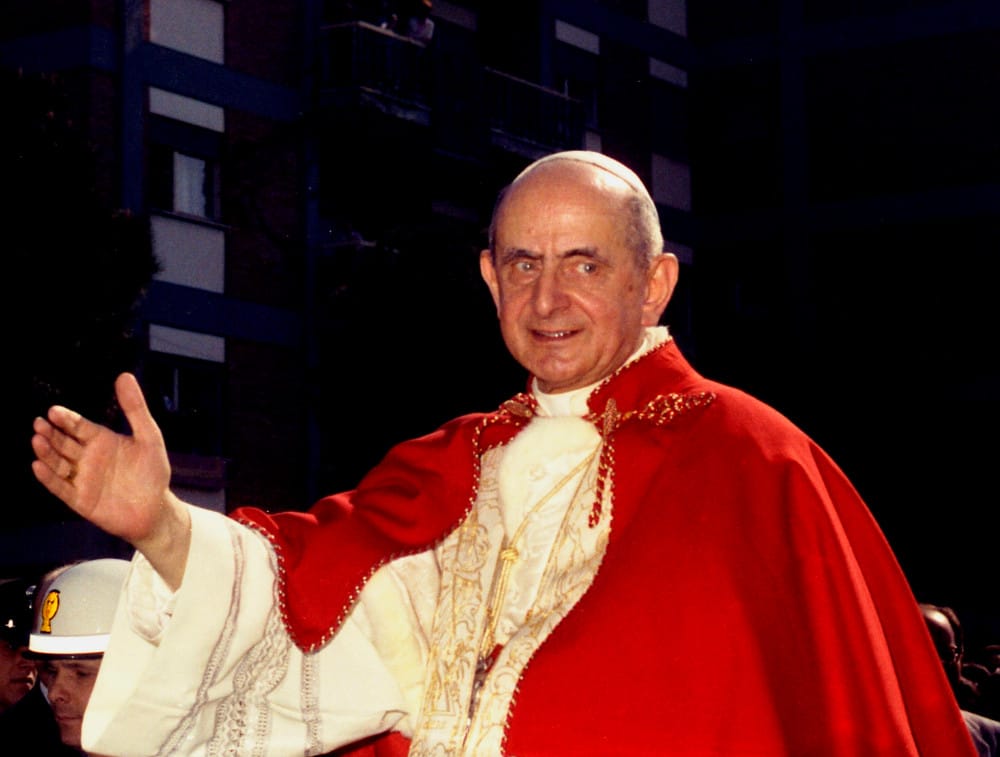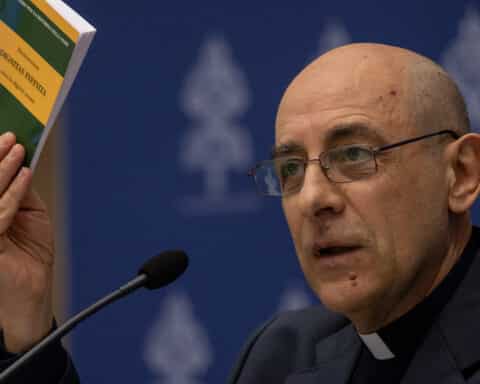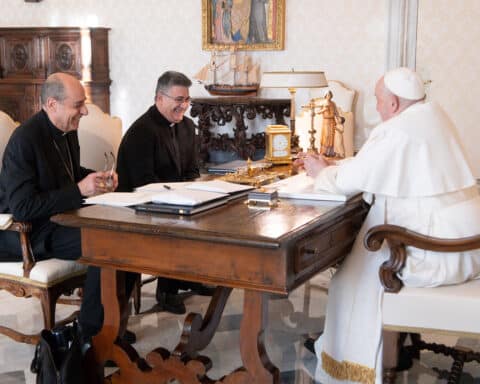Pope Francis called it “the greatest pastoral document that has ever been written to this day” (address to participants in the pilgrimage from the Diocese of Brescia, June 22, 2013). He was talking about Pope St. Paul VI’s apostolic exhortation on evangelization, Evangelii Nuntiandi (“Proclaiming the Gospel”), promulgated Dec. 8, 1975. Why such high praise? Pope Francis appreciated the clear message in Evangelii Nuntiandi exhorting every member of the Church (and the Church as a whole) to exercise a dual mission: to be ever more converted to Christ and to bring Christ ever more persuasively to the world in the present, historical moment one finds oneself.
Context
Pope Paul VI mentions two events that set the context for Evangelii Nuntiandi. The previous year, he had convened the Third Ordinary General Assembly of the Synod of Bishops (1974), which focused on the topic of evangelization. The bishops, in fact, asked the pope for “a fresh forward impulse capable of creating within [the] Church … a new period of evangelization.” The other event very much on the pope’s mind was the “10th anniversary of the closing of the Second Vatican Council,” which (he says) had one overarching objective: “to make the Church of the 20th century ever better fitted for proclaiming the Gospel to the people of the 20th century” (No. 2).
Read more from our Church Document series here.
Another motivation for writing Evangelii Nuntiandi, according to Pope Paul VI, was to counteract the “insidious” excuse — “which people claim to find support for in such and such a teaching of the Council” (No. 80) — that respect for people’s religious liberty meant not preaching the Gospel to them. The pope notes that proposing “the Gospel and salvation in Jesus Christ, with complete clarity and with a total respect for the free options which it presents — ‘without coercion, or dishonorable or unworthy pressure'” (No. 80) — fully respects the liberty of the person being evangelized. Moreover, the evangelizer has the “duty” to preach the Gospel by Jesus’ command, and all people have a right to hear “the Good News of salvation” so they may believe and be saved (cf. No. 80).
Content
In order to prepare the Church and her members for the duty of evangelization, Pope Paul VI invites his readers to meditate with him on how best to present (considering the signs of the time) the full truth of the Gospel to modern men and women “in a way that is as understandable and persuasive as possible” (No. 3). The pope turns first to the subject of evangelization, Jesus, to learn from his words and actions so the Church may imitate the Master. Then, based on Jesus’ example, the pope outlines various elements that are essential to evangelizing, focusing on the content of evangelization, the methods, those to be addressed and those responsible.

Jesus is “the very first and the greatest evangelizer” (No. 7). By his words and actions, he made known the Good News: the reality of God’s kingdom and the salvation of all people (cf. Nos. 8-10). Jesus’ teaching and preaching focused on how — through him — God’s kingdom was already present in the world and would be fully established in heaven on the last day. He also taught that salvation, i.e., liberation from sin and death, was available to all through him. He confirmed his words through the events of his life: his miracles, his death and resurrection, and the formation of a community in his name, the Church (cf. No. 12).
The Church, in fact, is born of the evangelizing activity of Jesus and Twelve [apostles], whom Jesus filled with his Holy Spirit and commanded to go out and proclaim the Good News, making disciples of all nations (cf. No. 13, 15). “Those who sincerely accept the Good News” seek God’s kingdom, build it up, and live it within the community of the Church (No. 13). The essential mission of the Church remains evangelization. Just as Jesus sent the Twelve to share his Good News, the Church now sends out its members to share the same news, which it “preserves as a precious living heritage” to be communicated (No. 15).
The Good News that the Church shares cannot be separated from the content of the Gospel handed on by Christ and preserved by the Church. As already noted, it can be shared in a way understandable to a particular audience, but care must be taken that it loses none of its purity. Jesus established his Church precisely to guard and protect his truth for the benefit of all people. Therefore, evangelization must include, first of all, the revelation of God by Jesus in the Holy Spirit (cf. No. 26). And not any god but God the Father of Jesus Christ, who ushers in God’s kingdom and saves the world (cf. No. 27). The salvation Jesus offers, however, cannot be reduced to “a simply temporal project” (No. 32). Evangelization must include “the prophetic proclamation of a hereafter” and the fulfillment of God’s promises of eternal life (No. 28). The sacraments, especially the Eucharist, complete evangelization in the sense that they express visibly the Church’s communion with God.
The methods of evangelization “vary according to the different circumstances of time, place and culture” (No. 40). But how one evangelizes must be done “in complete fidelity to the content of evangelization” (No. 40). The “first means of evangelization is the witness of an authentically Christian life” (No. 41). Such a witness by the individual Christian or by the Church as a body attracts others to Jesus (cf. No. 41). Still, preaching Jesus is also essential, and it takes many forms (cf. Nos. 42-48). “Person-to-person” sharing of the Gospel remains important (No. 46). The homily at Mass (and other liturgies) is a privileged moment when the priest is able to explain the Gospel message in a way suited to the assembly before him. The Church should also use well the tools of mass communication.
Concerning those to be evangelized, Evangelii Nuntiandi repeats the command of Christ to the Church that it is called to proclaim the Good News to all creation. But the exhortation highlights a few particular audiences as well. First and foremost, the Church must evangelize itself, for the Church needs constant conversion and renewal (cf. No. 15). Those who have received the faith of Christ may have stopped practicing, perhaps influenced by the increase of unbelief in the world (cf. Nos. 54-56). But even those who continue to practice need to deepen and nourish their faith so that it continues to mature (cf. No. 54). Others to be evangelized include those who do not know Jesus or who may practice a non-Christian religion (cf. Nos. 51, 53). They deserve esteem and respect, but they also have a right to hear about Jesus.
After considering the content, methods, and audiences of evangelization, Evangelii Nuntiandi states that the Church, the whole People of God, is responsible for the mission to preach the Good News (cf. No. 59). Indeed, evangelization is an ecclesial act done in communion with the Church and her pastors. An individual member who evangelizes does so as a member of the community of Christ and shares only the Gospel handed on by Christ (cf. No. 60). The individual members include the clergy, religious, and the laity. Bishops and priests have the special office of teaching the Faith (cf No. 68). The laity share the Gospel in the midst of the world, including their families (cf. No. 71). All members need serious preparation in order to be effective evangelizers. The preparation includes prayer, Bible study and catechesis, but most of all the member needs to yield to the Holy Spirit by seeking his inspiration (cf. No. 75).
Call
Evangelii Nuntiandi clearly calls every member of the Church to be an evangelizer, bringing the Good News to every “strata of humanity” (No. 18) so that individuals (including the evangelizers themselves) and the culture are transformed from within and made new in Christ. To do this task well, one needs to cultivate in oneself a “radical conversion” (No. 10) to Jesus Christ. Just as a white cloth soaked in red dye is transformed not only in appearance but also in its very fibers, the disciple makes the effort to be changed inwardly and outwardly to be more like Jesus. The effort involves “toil and suffering” as one turns from sin, but it also brings “grace and mercy” as one yields to Jesus. It ends in the beatitude of heaven (No. 10), the “pearl of great price” (Mt 13:46) worthy to be sought not only for oneself but also for one’s fellow men and women.
David Werning writes from Virginia.





